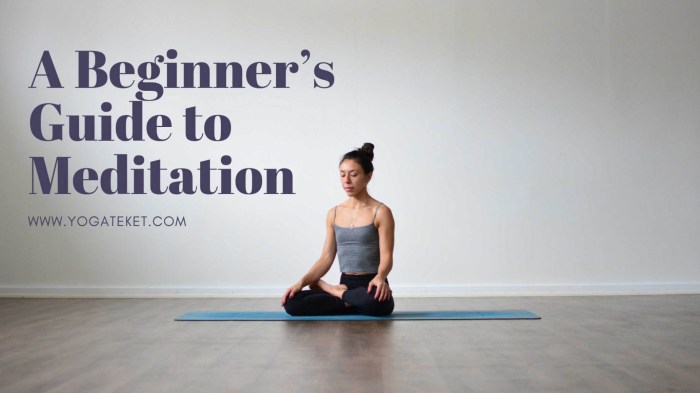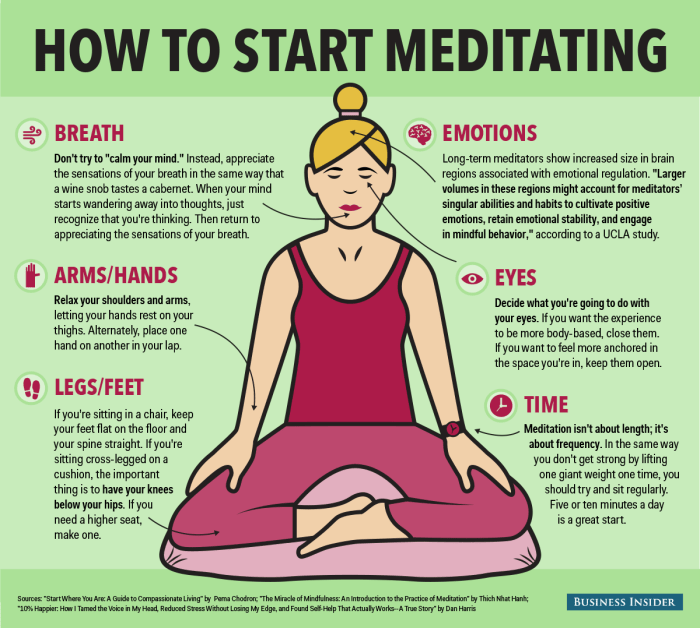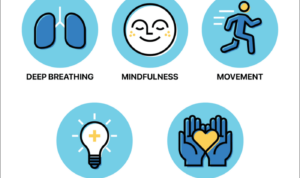Meditation for Beginners takes center stage, drawing you into a world of tranquility and self-discovery. Get ready to embark on a journey towards inner peace and mindfulness.
In this guide, we’ll explore the basics of meditation, from setting up your space to overcoming challenges and reaping the benefits of this ancient practice.
Introduction to Meditation for Beginners

Meditation is a practice that involves training the mind to focus and redirect thoughts. For beginners, meditation can provide numerous benefits such as reducing stress, improving concentration, and promoting emotional well-being.
Starting a meditation practice is important for beginners as it allows them to develop mindfulness, increase self-awareness, and cultivate a sense of inner peace. By dedicating time to meditate regularly, beginners can experience positive changes in their mental and emotional health.
Common Misconceptions about Meditation for Beginners
- One common misconception is that meditation is only for experienced yogis or spiritual gurus. In reality, anyone can start meditating, regardless of their background or beliefs.
- Another misconception is that meditation requires clearing the mind of all thoughts. While this can be a goal, it’s more about observing thoughts without judgment and gently guiding the mind back to focus.
- Some beginners may think that meditation is a quick fix for all their problems. It’s important to understand that meditation is a practice that requires time and consistency to see long-term benefits.
Setting Up Your Meditation Space
Creating a peaceful and comfortable meditation environment is essential for a successful practice. Your meditation space should be a reflection of tranquility and serenity, allowing you to fully immerse yourself in the present moment.
A quiet and clutter-free space is crucial for meditation as it helps eliminate distractions and allows you to focus inward. Make sure to choose a space in your home that is free from noise and interruptions, ensuring a peaceful atmosphere for your practice.
Decorating your meditation space can enhance the overall experience and create a sacred area dedicated to mindfulness. Consider adding elements such as candles, crystals, plants, or meaningful artwork to personalize your space and make it conducive to deep reflection and relaxation.
Optimizing Lighting and Air Quality
When setting up your meditation space, pay attention to lighting and air quality. Natural light can create a soothing ambiance, while fresh air can help you feel more rejuvenated and centered during your practice. Consider opening a window or incorporating air-purifying plants to enhance the atmosphere of your meditation space.
Basic Meditation Techniques for Beginners

Meditation can be a powerful tool for relaxation, focus, and overall well-being. Here are some basic meditation techniques that are perfect for beginners looking to start their practice.
Simple Breathing Exercises
Breathing exercises are a great way to begin your meditation practice. Start by sitting or lying down in a comfortable position. Close your eyes and take slow, deep breaths in through your nose, allowing your abdomen to rise as you inhale. Then, exhale slowly through your mouth, feeling your abdomen fall. Focus on the sensation of your breath as it enters and leaves your body. Repeat this process for a few minutes to calm your mind and body.
Different Types of Meditation Techniques
There are various types of meditation techniques that beginners can explore to find what works best for them. Some popular options include:
- Mindfulness meditation: Focus on being present in the moment and observing your thoughts without judgment.
- Guided meditation: Follow along with a recorded meditation that guides you through relaxation techniques and visualization exercises.
- Mantra meditation: Repeat a word or phrase silently to yourself to help focus your mind and quiet your thoughts.
Importance of Posture and Body Alignment
Posture plays a crucial role in meditation, as it can affect your ability to breathe deeply and stay focused. When meditating, sit or lie in a comfortable position with your back straight and shoulders relaxed. Keep your head aligned with your spine and avoid slouching. This alignment helps promote deep breathing and allows for better energy flow throughout your body.
Overcoming Common Challenges in Meditation
Starting a meditation practice can be challenging, especially for beginners. It’s common to face obstacles that may hinder your progress. Here are some tips to help you overcome these challenges and stay motivated in your meditation journey.
Dealing with Distractions
Distractions are a common challenge during meditation sessions. It’s normal for your mind to wander, but the key is to gently bring your focus back to your breath or mantra. Here are some strategies to deal with distractions:
- Acknowledge the distraction without judgment and gently guide your focus back to your breath.
- Use ambient music or white noise to drown out external distractions.
- Practice mindfulness throughout the day to improve your focus during meditation.
Staying Motivated and Consistent
Staying motivated and consistent in your meditation practice is crucial for progress. Here are some tips to help you maintain your meditation routine:
- Set realistic goals and start with short meditation sessions to build consistency.
- Find a time of day that works best for you and make meditation a part of your daily routine.
- Join a meditation group or community for support and accountability.
Benefits of Meditation for Beginners
Meditation offers a wide range of benefits for beginners, encompassing physical, mental, and emotional aspects. As beginners embark on their meditation journey, they can expect to experience positive transformations in various areas of their lives.
Physical Benefits
- Improved sleep quality
- Reduced stress levels
- Enhanced immune system function
- Lower blood pressure
Mental Benefits
- Increased focus and concentration
- Enhanced clarity of thought
- Reduced anxiety and depression symptoms
- Improved memory retention
Emotional Benefits
- Greater sense of inner peace
- Heightened self-awareness
- Improved emotional regulation
- Enhanced resilience in facing challenges
Personal Experiences
“Meditation has truly been a game-changer for me. I used to struggle with anxiety, but since starting a regular practice, I feel more grounded and at peace.”
Long-Term Benefits
- Stress management skills for life
- Enhanced overall well-being
- Greater emotional intelligence
- Improved relationships with oneself and others
Resources for Beginner Meditators: Meditation For Beginners
As a beginner in meditation, it’s essential to have access to reliable resources to enhance your practice and deepen your understanding of this ancient art form.
Recommended Books, Apps, and Online Resources
-
“The Miracle of Mindfulness” by Thich Nhat Hanh – A classic book that offers practical guidance on incorporating mindfulness into your daily life.
-
Headspace app – A popular app that provides guided meditation sessions for beginners and advanced practitioners alike.
-
Insight Timer – An app with a vast library of free guided meditations, music, and talks from meditation teachers around the world.
-
Mindful.org – An online platform offering articles, guided practices, and resources for those interested in mindfulness and meditation.
Meditation Classes, Workshops, and Retreats
- Many local yoga studios and meditation centers offer beginner-friendly classes and workshops to help you kickstart your meditation journey.
- Look for meditation retreats specifically tailored for beginners to immerse yourself in a supportive and focused environment.
Importance of Seeking Guidance from Experienced Teachers
While books, apps, and online resources are valuable tools, nothing beats the guidance of an experienced meditation teacher. They can provide personalized instruction, feedback, and support to help you navigate the challenges and deepen your practice.
